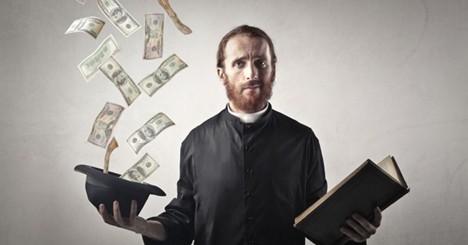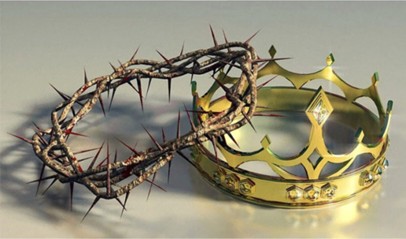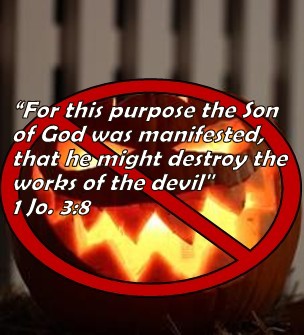
Mark 8:15
I was at work one day last month when I heard a news report over the radio, announcing a historic change. The announcer reported that Goshen College had just broken with 116 years of tradition by beginning this year’s series of basketball and baseball games with the playing of the national anthem. Standing to their feet, with bowed heads and reverent gestures, the “Anabaptist” college sang—for the first time in their 116-year history—their devotion to a flag. Apparently there was quite a stir, as news reporters and onlookers came out to witness this historic event. I had to wonder what the rival team, a Catholic university called “The Saints,” must have thought about it all.
As the radio announcer continued to report on the dispute that arose over this incident, I remember feeling somewhat embarrassed. Most of my coworkers know where I stand on these issues, so I felt as though someone was publicly exposing the sins of one of my family members.
It reminded me of another humiliation I had a few years earlier during one of the presidential elections. This time one of my supervisors, a Jewish man, was asking me who I was going to vote for in the upcoming election. I used the opportunity to explain to him the Christian concept of the two kingdoms. I explained to him that—simply put—Anabaptists don’t vote. He disagreed. An Amish man was right in front of us, so he challenged me, “Are you saying that this Amish man doesn’t vote?”
Being painfully new in Lancaster County, I smugly answered, “That’s right, just ask him yourself!” I stood there, confident of my Amish brother and his response to this Jewish man. Then he leaned over and asked the Amish man, “Are you going to vote in this election?” To which the Amish man enthusiastically replied, “You bet I am! I voted in the last election, I certainly am going to vote in this one!”
I was speechless and disappointed. Interestingly, not long after the incident I was back in the break room with a Baptist man that I worked with, and he asked me, “Isn’t it rather inconsistent to be both a conscientious objector and also to cast your vote for the Commander in Chief of the Army?” Surprised, I replied, “You mean you see that contradiction? It’s funny that you would see that so clearly, when so many of our own people are losing this concept so rapidly.”
Subtleties
The issue is a subtle one. On the one hand, it seems so innocent. We might ask, “So what’s wrong with just telling someone who our choice would be for President?” That may seem innocent enough, but perhaps it is just this type of subtlety that warranted Jesus casting this rebuke: “Beware of the leaven of Herod.” Akin to the insidious pathos of pharisaical thinking, Jesus warned that the infection of ‘worldly political thinking’ can grow in us, leading to our eventual spiritual destruction. Jesus’ use of the metaphor “leaven” in this context is sobering. This word picture brings to mind the way we use leaven (today called yeast) in cooking. The small amount of yeast necessary to make a loaf of bread starts out seemingly innocuous and insignificant. However, once added to the dough, it is not long before that small bit of yeast affects the entire loaf, often swelling it to two or three times its original size.
How is it with us today—in what way do we apply Jesus’ warning to “beware of the leaven of Herod?” Throughout history, when the politicians have vied for our attention, their issues have appeared so justifiable—so important. The political activists have made it seem un-American, unconcerned, and yes, even un-Christian to not get involved. However, when the records of history are reviewed, it is amazing how the church’s entanglement with these seemingly ‘good causes’ has littered a trail of casualties, often leading entire communities off course. One lesson we must learn from history is that the world has never come up with an ultimate solution to their problems. Their short-sighted cures will always lack the clarity to see the root causes of their disease. As Jesus said, “Except a man be born again, he cannot see the kingdom of God.”
History of the ‘Political Christian’
Around the year 312 A.D., during the reign of Constantine, we find the church’s first major compromise with a political leader who was trying to do his best for the church. The political platform in those days sounded pretty good:
Who would not have supported the legalization of Christianity? Who would not have voted to end the persecution? All over the empire, Christians began to throw their lot in with this new political agenda. Revealing the spirit of the leading Christians at the time of Constantine, the church historian Eusebius wrote:
“Surely it must seem to all who duly regard these facts that a new and fresh era of existence had begun to appear, and a light heretofore unknown suddenly to dawn from the midst of darkness on the human race: and all must confess that these things were entirely the work of God, who raised up this pious emperor to withstand the multitude of the ungodly.”
History, however, sadly reveals what a detrimental effect the leaven of this well-intended emperor had on the entire Christian world. If Eusebius could have seen what unprecedented damage resulted from the church partaking of this political leaven, I wonder if he would have been so elated.
Just War
Later, the man whom history calls “St. Augustine” turned to political help when he could not control the post-Constantine church with his reasoning power alone. In the fatal words spoken from the Council of Carthage in 404, Augustine said, “It is now full time for the emperor to provide for the safety of the Catholic church, and prevent those rash men from terrifying the people, whom they cannot seduce.” After these words the church more and more adapted the ‘Just War’ theology, and ever increasingly used the state to accomplish her end. Once, when Augustine was challenged if it was right to use the violence of the state to accomplish spiritual ends, he responded:
“It is indeed better that men should be brought to serve God by instruction than by fear of punishment or by pain. But because the former means are better, the latter must not therefore be neglected …. Many must often be brought back to their Lord, like wicked servants, by the rod of temporal suffering, before they attain the highest grade of religious development …. The Lord himself orders that the guests be first invited, then compelled, to his great supper.” [1]
The suffering that proceeded from these words is incalculable. Still to this day, men and churches use this reasoning to justify their killing and persecution of others.
Middle Ages
Likewise throughout the middle ages, when the evils of the day surfaced in the church, the church again and again fell to the temptation to resort to political advantage to solve their problems. Each time, it seemed like such a good idea. What self-respecting potato farmer wouldn’t support the protection of the Holy Lands against the Muslim bandits in the 1200s? In much the same way, many church leaders of that day reasoned: “If God is truly punishing the earth with disease and plagues because of the witches and heretics, then wouldn’t it be a good idea to get rid of them?”
Leading a call for a crusade against the Muslims in the Holy Land, Pope Urban II issued this decree:
“On this account I, or rather the Lord, beseech you as Christ’s heralds to publish this everywhere and to persuade all people of whatever rank, foot-soldiers and knights, poor and rich, to carry aid promptly to those Christians and to destroy that vile race from the lands of our friends. I say this to those who are present; it is meant also for those who are absent. Moreover, Christ commands it. All who die by the way, whether by land or by sea, or in battle against the pagans, shall have immediate remission of sins. This I grant them through the power of God with which I am invested.”
History records that the leaven of this battle cry threw the common people present into some kind of charismatic frenzy. It is reported that in a shout of triumph the crowd roared and chanted with one voice, “It is the will of God! It is the will of God!” as they rushed into their murderous slaughter.
Prohibition and WWI
Bringing it closer to home, an interesting lesson can be learned by the political involvement of the Church of the Brethren in the early 1900s. Toward the end of the 1890s, public opinion against the sale of alcohol became increasingly hostile. In particular, pietistic and revival groups such as the Methodists, Baptists, Presbyterians, and even Congregationalists really took up the issue. Preachers like Billy Sunday scorched city after city with strong messages, calling for an end of the consumption and, particularly, the sale of alcohol. This passionate appeal culminated in a monumental victory when on December 18, 1917, Congress actually passed the 18th Amendment, outlawing the sale of alcohol.
During this time, zealous bands of convinced evangelical Christians formed small groups of activists called “temperance leagues.” These activists literally went door-to-door, asking people to sign their petitions and calling for the government to pass laws to stop this evil. “Surely any true Christian would be against the sale of alcohol” they would say. Originally, when they first encountered the Anabaptists, the Anabaptists told them that they did not think the answer to the sins of the world could be fixed by politics. However, in time many groups—especially those who were already united with the Evangelicals in some of the prohibition/revival meetings—joined with “the cause.” Soon after, voting followed; and not long after that, men even began to run for different political offices. The Church of the Brethren, which was heavily involved in the revival/prohibition meetings, was hit particularly hard.
The “Anabaptist” Governor
It was then that the inevitable happened. The increased political involvement and agenda of the Church of the Brethren culminated in one of their own men, Martin Grove Brumbaugh, being elected as Governor of Pennsylvania. Soon after his election, a riot broke out in Pittsburg, which put his Anabaptist convictions to the test. Inescapably, Brumbaugh turned to the sword and called in the militia to quiet the rebels. Sadly, when WWI broke out, Brumbaugh saw the conflict as a “holy war,” and even ordered all executive branch employees to take a loyalty oath or face dismissal.
Many of the conservative Brethren wanted Brumbaugh to be disciplined by the church. However, the decision was made by the general conference to let the Philadelphia congregation decide how to deal with the problem. Unfortunately, this decision ultimately meant that in the end nothing would be done.
Before they knew it, the entire Church of the Brethren was adversely affected by the politics of Brumbaugh. How could the world believe that the Brethren were a nonresistant church, when their most famous member was calling in a militia and requiring his own cabinet to swear oaths? Later, to the great disappointment of many of the conservative Brethren, Brumbaugh even attempted to run for President against Woodrow Wilson. It was not surprising then, when WWI broke out and the country initiated the draft, many young Brethren men were rejected from their conscientious objector status, requiring them to take up arms and fight.
Collateral Damage
The effectiveness of the temperance movement was short lived. On March 23, 1933, after President Franklin Roosevelt signed a bill allowing for the sale of alcohol, he publically commented, “I think this would be a good time for a beer.” Tragically, all three of Billy Sunday’s sons ended up living scandalous lives. Unfortunately, they were involved in the very sins that their father so zealously preached against. The effect of politics on the church, however, would be longer felt. In her book Vera’s Journey, Judy Yoder describes the attitude and public opinion facing the Brethren church during this time.
“This was to be a war that ended all wars. All hands were needed to make it so. If they could be involved in politics the previous year to vote against alcohol, why should they not respond to a cause much greater than Prohibition? Those who had gone so far as to vote for a President had better be willing to fight for him now.”
Judy Yoder continues:
“The brethren who for some time had been moving in step with believers in other Protestant churches suddenly found themselves in the crosscurrent of their nonresistant background and the position of those they had been working with in the outreach of the church. A specially-called conference of elders issued a statement against military involvement, but it was quickly withdrawn under government pressure. Many Brethren felt confused about where their church stood. Hadn’t they worked hand-in-hand with other church groups in social reform? Hadn’t they joined forces with them on the mission field?”
Hmmm …
WWII
During WWII, there were many heroic stories of Anabaptist churches who stood strong against the political pressures and tides that surrounded them. However, the American church in general continued to run headlong into compromise, chasing after worldly solutions to their problems. Once again, the age-old call went forth, that certainly this war was justifiable. What decent, red-blooded American would not want to support a strong stance against Hitler? Furthermore, the American church greatly feared the evil consequences if Hitler was not stopped.
But once again, association with the world would yield its bitter consequences. In seeking to fortify herself by the state, the American church would end up making deadly compromises and adulterated alliances, being unequally yoked with the world. You see, in order to come against the evils of Hitler, America—including American Christians—was required to throw in their lot in with Marxist Russia, under the leadership of Joseph Stalin. The tragic consequences of this compromise are only now fully coming to light. Historians now claim that the crimes committed by Stalin and the Communist Party during this time far exceeded that of Nazi Germany. Some historians claim that Stalin was responsible for three times as many murders as Hitler.
These are just a few examples. It appears that this is a lesson that the church finds very difficult to learn. The tricky part about this continual failure is that each time the cause seems so right. Often, it is not until years later that the fruit of the subtle lies are made manifest. Scripture tells us “There is a way which seemeth right unto a man, but the end thereof are the ways of death.” Pr. 14:12 Even after a casual look through history, it would be an understatement to say that some of the worst atrocities ever inflicted upon mankind have been wrought at the hand of men who thought they were doing God a service. There will always be another crisis. The point is that Jesus has left us a beautiful plan … it is called the Kingdom of God. We have the confidence that Jesus has overcome the world. Trusting in Him, we need never fear the agendas of earthly men.
“That Fox”
There is a passage in Luke 13:30-31 that can be quite instructive for us if we will take heed. In this passage, a Pharisee tries to scare Jesus by warning him about the evil intention of Herod against His life: “The same day there came certain of the Pharisees, saying unto him, Get thee out, and depart hence: for Herod will kill thee.” In answer to this crisis, Jesus used some of the strongest language he ever spoke to describe his feeling about a man. “And he said unto them, Go ye, and tell that fox, Behold, I cast out devils, and I do cures today and tomorrow, and the third day I shall be perfected.” Lu. 13:31-32
“That fox …” Those are strong words. They imply deceit and cunning. Is it any different today? What about us? Are we getting pulled into the crossfire of politics? Are we looking to the agendas of ungodly men to fix the problems of the world? More specifically, let’s get practical and look at some of the potentially “just” political causes of our day. Is it okay for a Christian, out of compassion for the poor, to align himself with the liberal agenda of the Democratic party, and vote to support paying for the health care of the poor children? This sounds like a good cause. However, ironically, the same agenda that supports helping children that are alive also supports the killing of children that are unborn—obviously a deadly compromise. Likewise, on the other side of the political fence, abortion certainly is an evil of our day, and it would seem that throwing in our lot with the conservative politics of the Republicans would be a good idea. However, just like the deadly compromise with the Democrats, throwing in your lot with the Republicans to support the protection of unborn children in this country will also require your support to blow them up in Iraq and Afghanistan.
Liberal Left
We support:
Abortion
Gay marriage
Feminism
No prayers in school
Government Public Education
Conservative Right
We support:
Capital punishment
Anti-immigration
Increase military spending
Preemptive strikes on other countries
War and building up of national arsenal
Increase rights for big business
Decrease aid for the poor, sick, and aged
What Would Jesus Do?
How long will the church give its allegiances to the agendas of the prince of this world? Are we being deceived again? Perhaps the phrase “that fox” should ring in our ears again. Church, please wake up … If the politics of Jesus are ever going to change the world, they are going to have to at least start with the church. I wonder, does the church even believe we have the cure anymore? The Kingdom of God is the timeless answer to the political problems of every age. More than just a quaint meditation, the Bible has a design that will turn this world upside down—or rather, from God’s perspective, right side up. If we “seek first the kingdom of God” and pray that His kingdom would come “on earth as it is in Heaven,” then the great ideas and subtle lies of earthly leaders will be seen for what they truly are.
Oh, brethren … “Beware the leaven of Herod!”~
[1] Augustine of Hippo, De Correct. Donatist, c. 6, § 24
Created on 10 June 2010.







